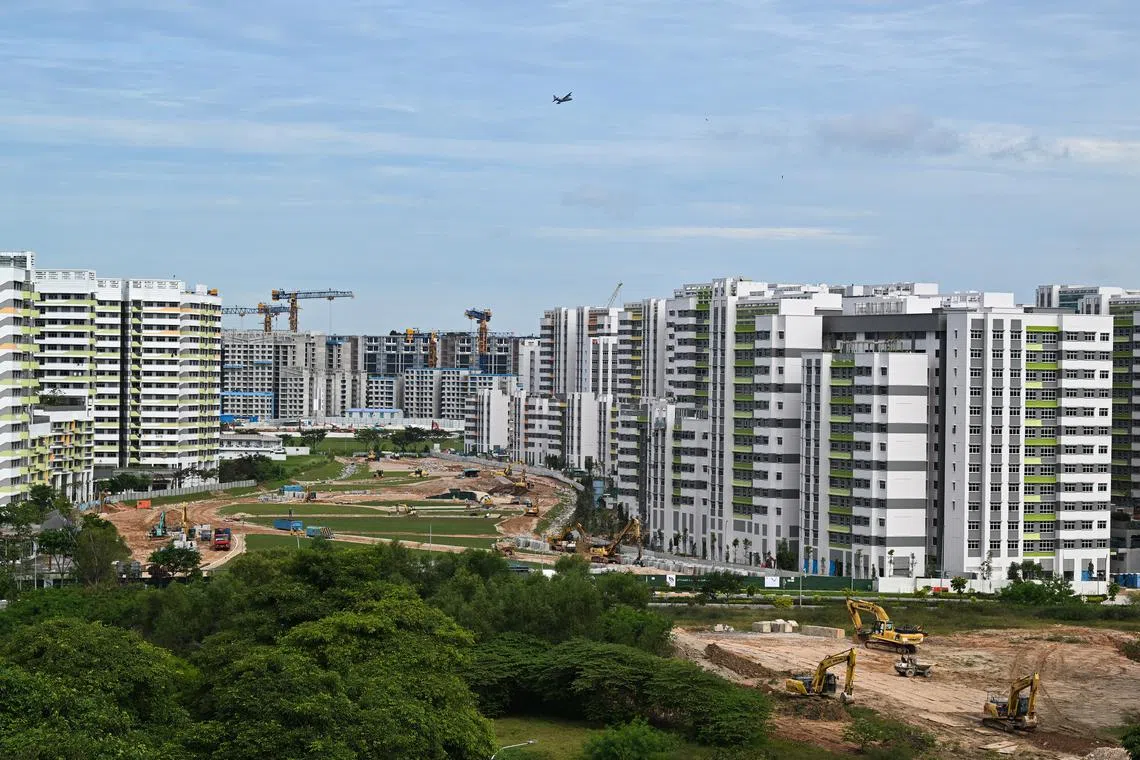HDB to ramp up BTO projects, with 150 to be built at same time by 2025
Sign up now: Get ST's newsletters delivered to your inbox

For many years before the pandemic, application rates for BTO flats were low and resale prices were soft but when Covid-19 hit, housing demand shot up.
ST PHOTO: LIM YAOHUI
Follow topic:
SINGAPORE - Singapore has ramped up its public housing programme to meet the current strong demand.
About 100 Build-To-Order (BTO) projects are currently under construction, and this will increase to about 150 concurrent BTO projects by around 2025, said National Development Minister Desmond Lee on Tuesday.
Responding to several MPs on why the Housing Board did not build more flats at a faster clip, Mr Lee said HDB is already “building aggressively and at large scale”.
“By contract value, this makes the HDB the largest housing developer and it also exceeds all the other private residential housing contracts combined by more than 50 per cent,” he said in a speech to close a 12-hour debate on affordable and accessible public housing that spanned two days, with 26 MPs speaking.
Mr Lee noted that HDB is not the only developer ramping up building and construction to catch up on Covid-19-related delays suffered in existing projects as the pandemic began to subside.
“Fiscal resources, foreign manpower and construction capacity are not without limits,” he said.
Mr Lee noted that some MPs, including Leader of the Opposition Pritam Singh, Workers’ Party (WP) MP Louis Chua and Progress Singapore Party (PSP) Non-Constituency MP Hazel Poa, have suggested that the Government has underestimated demand and under-built the supply of flats.
The Government has models that take into account marriages, births, deaths, income levels, economic conditions and other factors, but it is not a “perfect science”, he said. It also cannot account for sudden shocks and their impact on human psychology and market behaviour.
For instance, for many years before the pandemic, application rates for BTO flats were low and resale prices were soft but when Covid-19 hit, housing demand shot up, he said.
Mr Lee cautioned that the housing market is highly sentiment-driven and demand can suddenly appear, or disappear, overnight. He cited how housing demand fell after the Asian financial crisis struck in 1997, and HDB ended up with 31,000 unsold flats, which took more than five years to clear.
While the unintended oversupply meant that home buyers could walk in to buy ready flats in the early 2000s, others who bought flats just before the crisis ended up with negative equity.
“The many unsold flats represented a waste of taxpayers’ money. The holding costs incurred from holding the vacant housing stock are not inconsequential; money that could have been well spent on other uses in healthcare, education and other areas,” said Mr Lee.
He reiterated that public housing has to be kept affordable and accessible, not just for the current generation of Singaporeans but also future generations.
Cautioning against robbing future generations of land or fiscal resources by lowering BTO flat prices now, Mr Lee set out why the Government disagrees with the PSP’s proposals and its motion.
“We believe that we must maintain housing accessibility and affordability while keeping sustainability in mind, and uphold a culture of politics where we discuss hard truths and trade-offs in a transparent manner, even if these may not be popular,” he said.
PSP Non-Constituency MP Leong Mun Wai had proposed that Singaporeans who buy a BTO flat and live in it their entire lives be exempted from paying for land costs.
Rebutting his proposal, Second Minister for National Development Indranee Rajah said the PSP scheme is effectively a “national prepaid rental with an option to buy”
On WP MPs Leon Perera and Gerald Giam’s proposal to peg non-mature estate home prices at three times the median annual household income, Mr Lee said the current ratio stands at around five for non-mature estates and around three or less for lower-income households.
Importantly, the vast majority use their CPF monies to pay their mortgages with little to no cash, which gives a sense that BTO flats are broadly affordable, said Mr Lee.
“While the (WP) proposal sounds attractive, it ignores the trade-off that far lower prices would attract even more flat applicants. It also does not address the windfall gains enjoyed by flat buyers, some of whom may be from the higher-income groups,” he said.
“How do you ensure the affordability of the resale market over time? That dogmatic proposal achieves none of that. And so, we think this is one-dimensional,” added Mr Lee.
Mr Singh, who was the last MP to speak, proposed to amend Mr Lee’s motion
Concluding his speech, Mr Lee acknowledged that the public housing system is not perfect.
“There are things we need to improve today and tomorrow. But to say it is fundamentally, through and through, unaffordable and inaccessible and needs a radical change of the kind that (Mr Leong) is proposing together with his party, is something we cannot accept.”
Parliament later voted to pass Mr Lee’s motion. It rejected Mr Singh’s amendment and Mr Leong’s motion.


